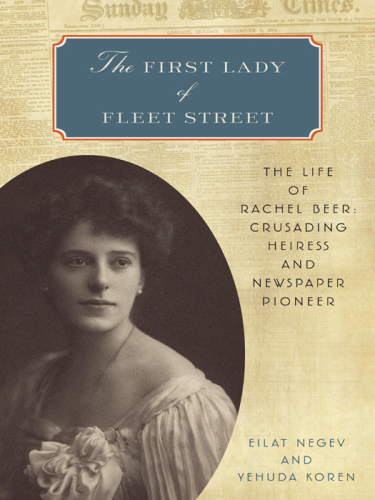
The First Lady of Fleet Street
The Life of Rachel Beer: Crusading Heiress and Newspaper Pioneer
کتاب های مرتبط
- اطلاعات
- نقد و بررسی
- دیدگاه کاربران
نقد و بررسی

October 24, 2011
During a time when most women had little access to even reading newspapers, Beer was the first woman to edit two newspapers in Victorian England. From an early age, Rachel Sassoon resisted the conventions of her time, refusing “to settle for the sheltered but unchallenging existence of a society matron.” When she married the youngest newspaper owner in England, the immensely wealthy Fredrick Beer, the pair became one of Victorian England’s most influential families. Both the Sassoon and Beer families were like the Rothschilds, wealthy Jewish capitalists. Initially working as a contributor at her husband’s paper, The Observer, Beer quickly became assistant editor. The couple then purchased the Sunday Times, with the intention of installing Rachel as editor. Her first editorial appeared on September 30, 1894. Wishing “to move beyond the domestic sphere and influence public agenda,” Beer wrote extensively about wasteful public spending, the working class’s battle for higher wages, women’s right to vote, foreign affairs, and politics, including the Dreyfus affair. At times, the cast of characters becomes unwieldy. Still, Negev and Koren (Lover of Unreason and In Our Hearts We Were Giants) have done a commendable job of retrieving Rachel Beer’s legacy of remarkable professional contributions and glittering social life.

November 15, 2011
Portrait of two important late-19th-century English families and their connection to the newspaper industry. Negev and Koren (Lover of Unreason: Assia Wevill, Sylvia Plath's Rival and Ted Hughes' Doomed Love, 2006, etc.) spend an inordinate amount of time detailing the religious ancestry and great wealth of Rachel Sassoon and her husband Frederick Beer, even though both rejected their Jewish heritage. Not until well into the narrative do the authors finally begin to chronicle how the owners of the Observer and the Sunday Times took active roles in their business. This period was a time of great social and political changes, completely altering the methods of reporting the news. The advent of the telegraph enabled instant news and regular columns from around the world. The socialite pair first became active in the running of their newspapers in the early 1890s, and Rachel maintained her role throughout her husband's subsequent illness. Over a mere eight years, Rachel's papers righteously reported women's issues, the working poor, the Dreyfus Affair, the Boer War and the establishment of the Penny Post. Even as she attempted to maintain a neutral position, her liberal views shaped her newspapers and influenced government and the populace alike. After Frederick's death in 1901, she ceased her involvement with the papers entirely. Even so, her influence on journalism and particularly women in journalism ensured her place in history, even though those tedious Victorian "gentlemen" generally ignored and dismissed her work. The successes and sufferings of the Beers and Sassoons makes for interesting material (Rachel was poet Siegfried's aunt), but the authors missed an important opportunity to concentrate more on Rachel's success in running her newspapers.
(COPYRIGHT (2011) KIRKUS REVIEWS/NIELSEN BUSINESS MEDIA, INC. ALL RIGHTS RESERVED.)

October 1, 2011
The marriage of Rachel Sassoon and Frederick Beer united two leading Jewish families in Victorian London, but the socially aware Rachel didn't want to be just a rich matron. So she ended up owning and editing a national newspaper--the first woman to do so, at a time when women did not yet have the vote. The authors specialize in intriguing, little-known lives, e.g., a dwarf family that survived the Holocaust, so Rachel Beer seems right up their alley. I'm intrigued.
Copyright 2011 Library Journal, LLC Used with permission.

February 1, 2012
During the Victorian era, at a time when women couldn't vote and had little control of their lives, Rachel Beer owned and controlled the Sunday Times in London. She was also eventually editor of the Observer, the paper her husband, Frederick, inherited from his father. They were from prominent Jewish immigrant families: Rachel was born a Sassoon, with wealth from commercial enterprises from Baghdad to Bombay, including the opium trade; Frederick, of Frankfurt Jewish heritage, was inheritor of a fortune from railroad and telegraphy businesses. Their marriage combined fortunes and ambitions at a time of great social change. Weary of the life of a socialite, Rachel bought the Sunday Times and used it to champion women's rights, free education, and other progressive causes. Negev and Koren recount a turbulent period in world politics and journalism and Rachel's relationships with historic figures from Emile Zola to Alfred Dreyfus. At her husband's death, her activism and her fortune made her the target of family accusations that she was mentally unstable. A fascinating portrait of a major figure in journalism.(Reprinted with permission of Booklist, copyright 2012, American Library Association.)

























دیدگاه کاربران